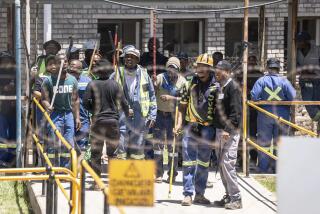A Strike Gorbachev Can’t Afford to Lose : Soviet Union: A snowballing stoppage by miners threatens the Soviet leader with a loss of worker support--and his mandate to rule.
- Share via
A crucial struggle has resurfaced in the Soviet Union. For the third time in 21 months, Soviet coal miners have downed tools in a strike that has now spread to more than 160 of the Soviet Union’s 500 mines and involves more than 350,000 workers.
In recent days the month-long strike has been gathering momentum and, with 300% food price increases expected next week, could spread to oil, steel and railway workers. For this reason, on Tuesday the Supreme Soviet was debating a resolution to suspend all strikes for up to four months.
The strike began March 1 in the century-old, antiquated mines of Donetsk in southern Ukraine and quickly spread to western Siberia. Soon miners were on strike in Vorkuta and Karaganda, hotbeds of worker radicalism that had been key centers of Stalin’s death camps. The miners of Chervonohrad, in the nationalist western Ukraine, have joined the struggle as have the miners of Rostov and Sakhalin in the Far East.
When miners first struck in June, 1989, they described themselves as “true communists” eager to revive worker control. They believed that Mikhail Gorbachev would work with them to reform an inefficient mining industry that employs as many managers, supervisors and paper-pushers as miners. Perhaps for this reason, Soviet authorities not only gave strikers unlimited access to television and the press, but also guaranteed their wages during the strike.
Now the miners are demanding President Gorbachev’s resignation, calling for new parliamentary elections, supporting the devolution of power to republics and striking for a 150% wage increase to offset sharp price rises. “The Soviet government . . . is placing the full brunt of the economic crisis on the workers,” said the Independent Miners Union vice chairman, Alexander Sergeyev, on March 7. “This is raising the indignation of all workers, including the miners.”
In response to the strike wave, authorities have shut off strike-committee telephones and telexes and have begun hauling strike leaders before state procurators who threaten them with criminal proceedings. Miners are being warned that residential communities located around mines will be cut off from electricity and food supplies, exposing miners’ families to great hardships.
While the authorities are playing hard-ball with strikers, the Kremlin has reason to be very nervous. With coal production in 1990 down 9% from 1988, oil production down 7% from a year ago and environmentalists pressing to shut down the Soviet Union’s unsafe nuclear power plants, the government needs the goodwill of the 1.25 million coal miners to keep industry going. By last Sunday the strike was already seriously affecting output, with daily coal shipments to Soviet workplaces down by 35% and some steel mills grinding to a halt. This is why Prime Minister Valentin S. Pavlov has agreed to meet with miners on Friday.
As the strike has spread, the miners have seen a mounting barrage of calumnies on state-controlled TV. In early March, Gorbachev went on air to denounce the strikers and suggest that the fiercely independent miners had been inspired by his political opponents. In fact, it was worker collectives--not political activists--who demanded the strike.
The struggle unfolding in the mines may not be grabbing the headlines in these post-Gulf War days, but it is nonetheless pivotal to the Soviet future. The miners represent a capable, alternative democratic leadership free of the shackles of ideological cant. They are feared by Gorbachev because he knows that without support from workers, he has no mandate to rule and increasingly will need to rely on the unproductive and unimaginative forces of internal security and militarism.
If the miners, and other free unionists, continue to gain strength, they will help to peacefully transform the Soviet Union into a stable, democratic community of peoples based on economic and political pluralism.
More to Read
Sign up for Essential California
The most important California stories and recommendations in your inbox every morning.
You may occasionally receive promotional content from the Los Angeles Times.













